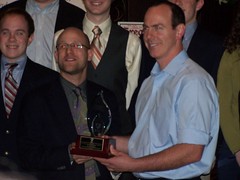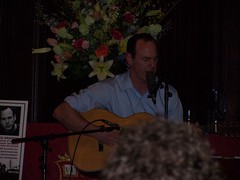The church(!) pews were filled with an odd assortment of mostly punk rock kids/adults, a few parents, and other middle age adults. The front pew was filled with Greg's dad and his fiance. Sadly (well sad for the stalker in me), I couldn't catch a glimpse of her. I did already know that they were getting hitched because Brett & Jay don't seem to understand the peeping tom potential of their beloved myspace. But I digress ...
The event began with introductions by the president of the Harvard Secular Society and the all important radio intros (it was being sponsored by and broadcast on NPR as well as on local tv). Then Greg came out, in a suit, along with the Humanist Chaplain at Harvard (seriously, how do you get that job?) who gave a long, mildly incoherent, nervous introduction to the award, Graffin, and why it was awarded to him. During this time, Greg stood in the middle of the altar looking awkward.

Students from the society then read leaders to Greg from his PhD advisor, Will Provine, his co-author of Is Belief in God Good, Bad or Irrelevant?: A Professor And a Punk Rocker Discuss Science, Religion, Naturalism & Christianity
 Finally, they presented Greg with the award and he came up to the podium and gave a very professor-ish lecture on the history of humanism. Frankly, it was a bit hard to pay attention to - especially considering we hadn't got much sleep the night before and the fact that I didn't have to take notes or write a paper on it (Grades are apparently quite the motivator. Who knew?).
Finally, they presented Greg with the award and he came up to the podium and gave a very professor-ish lecture on the history of humanism. Frankly, it was a bit hard to pay attention to - especially considering we hadn't got much sleep the night before and the fact that I didn't have to take notes or write a paper on it (Grades are apparently quite the motivator. Who knew?).After finishing his speech, Greg took off his suit jacket - proclaiming that he'd never played in a suit, rolled up his sleeves and played a few acoustic songs. He played: Highway off his solo album,Cold as Clay, Suffer off Bad Religion's album Suffer

After he finished playing, there was a Q&A session with the audience. Although I had a few questions in my head, I didn't go up to ask them for a few reasons. Firstly, by that point, I was utterly exhausted and knew I had a 45 minute T ride preceding my collapse into bed. Secondly, I know how judgmental I am of the people who ask questions (especially the pretentious "i'm an aaartist music snobs" and that overweight red-headed dude who felt entitled to sit in the front row despite the fact that it had been roped off ... for Greg's family. Seriously, what a douche. Seee?)
Anyway, Adam and I spent much time discussing the questions we might have asked on the subway ride to the hotel so I thought I'd pose them here where they may live on in internet oblivion.
- In Is Belief in God Good, Bad or Irrelevant?, Graffin discusses Steven Jay Gould assertion in Wonderful Life: The Burgess Shale and the Nature of History
that, if the Big Bang were to happen again, i.e. if we could start the world & evolution over again, humans wouldn't exist. While discussing this, he argues that evolution isn't logical. This struck me as a huge contradiction for someone who calls himself a naturalist. It seems to me that logic, and by logic I mean mathematical logic not our colloquial logic-as-a-synonym-for-reasoning, is the very underpinning of the experimental method: if A given B then C. Verifiability is essential to science and naturalism and verifiability requires replication; it require that, given the exact same circumstances, you will obtain the same results and if you don't, it means that the initial experiment was invalid and there are likely causes that aren't being taken into account. While I can completely believe that if the world were to start over again, the existence of humans would be highly improbable; I cannot believe that if the world were to start over again and every determining event happened exactly the same, humans wouldn't exist. I cannot believe the latter because it, in essence, disproves the scientific method itself. Having never read Wonderful Life, but having read another book by Gould, Full House: The Spread of Excellence from Plato to Darwin
, I would have asked Graffin to elaborate on Gould's assertion and his own statement on the matter.
- In Is Belief in God Good, Bad or Irrelevant?, Graffin displays a disdain for philosophy. I'd love to hear him expand upon this.
- It seems to me that the issue of creationism vs. evolution; religion vs. science is always set up as a strict dichotomy - including and perhaps especially by Graffin. (His PhD dissertaton was on religious belief amongst evolutionary biologists). As the daughter of two scientists (PhDs in physiology) and regular church goers, I grew up totally (blissfully?) unaware of this inherent conflict. Granted, I did not end up religious at all but my sense is that among scientists in general (not to mention the plethora of people trained in science and biology for other professions - medicine, pharmacology, nursing, teaching, engineering, etc) people are able, however tenuously, to rectify their belief in science with their belief in god. Regardless of how illogical or bullshit I may think that reconciliation is, the fact is that it exists. I'd be interested to hear Greg's thoughts on the matter.
- Since Graffin's father was at the award's ceremony, I would have loved to ask what his dad thought of Bad Religion.
- Graffin mentioned, in a response to a Q&A question, that he had not grown up religious at all and while that was good in many respects, there are essential questions of the world and our place in it that are taught in places like Sunday school; questions that he didn't have answered until he discovered science. I have occasionally missed going to church, especially during turbulent times in my life. For me, I think what I was longing for was the sense of community and roots that are found in religious institutions. (Happily, I have learned that many atheist parents are starting "Sunday schools" in their area to combat this very issues. Perhaps the existence of humanist societies also fills this void.) I would be interested to know how he, as a parent, instilled his values in his children and combated this issue.
- When introducing Graffin, the Humanist Chaplain quoted a song from How Could Hell Be Any Worse?
, which Greg wrote when he was 15. I know that I did and said some stupid, embarrassing things when I was 15 and I wonder how Graffin feels to hear those words now. I also wonder how it feels to be 42 and to influence 15 year olds.

No comments:
Post a Comment